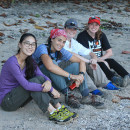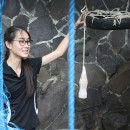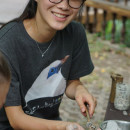A roller-coaster of fun and learning Past Review
By Tanya Tam (German Swiss International School) - abroad from 07/18/2016 to 08/09/2016 with
Broadreach: Bali - Veterinary Medicine College
I learned a lot about Balinese culture, indigenous animals, and most importantly, myself. Being away from home for almost a month with people I didn't know was an experience in itself, and taught me a lot about the importance of being united and building others up along with yourself.
Review Photos



Personal Information
| How much international exposure did you have prior to this program? | 6 months+ |
Review Your Program
|
* Overall educational experience
Academic rigor, intensity, resources, etc. |
There was a good balance of fun/outdoor activities and academics. The material was easy to learn and was the appropriate difficulty for a summer programme. I enjoyed doing the field exercise questions more so than the journals, which included more personal emotions etc., but I know that a lot of people may find the journals important in terms of encouraging them to reflect on their feelings on experiences of the day. I also enjoyed doing the tests in the middle and at the end of the course. |
|
* Host Country Program Administration
On-site administration of your program |
I felt the instructors managed everything well. I did not enjoy, however, that they did not allow students to use the internet during down time. I think it is necessary to allow internet usage at the end of each day when activities are all over, even if it means enforcing a strict rule of confiscating phones that are used inappropriately. |
|
* Housing:
How satisfied were you with your living arrangements? |
The housing in general was good, with the exception of the first hotel Taman Harum. This was because the room we were assigned had an outdoor bathroom, meaning that many mosquitoes entered the room and bit us everywhere. Otherwise, the housing was good and I loved Abalihouse in particular. |
| * Food: |
Being from Hong Kong, I did not have much difficulty adapting to the food, and found the food generally good. It was also very suited to vegetarians and even vegans, due to the local diet. I would imagine, and I observed, that many students from the US found it a struggle to live on rice as their staple carbohydrate, but I do think that outside of Sulawesi, the variety and choice of food was incredibly wide. US students could easily order pizza, pasta etc. as it was on most menus in Bali. |
|
* Social & Cultural Integration:
How integrated did you feel with the local culture? |
In Bali, we were allowed free time in the tourist areas to shop and eat. Although this did not give us much exposure to local culture due to the tourist nature of the area, we were given opportunities to meet shopkeepers, salesmen and staff at local restaurants. It was eye-opening to meet such positive, relaxed and friendly local people. In Sulawesi and the more rural or remote areas of Bali, we were also in contact with many locals out of a tourist context. I really enjoyed meeting people like the chief police of an area of Bali, and being invited into his home complex. They offered us tea and fried bananas, which were absolutely delicious. Seeing the Bali traditional dance and doing batik painting was also a lot of fun and very educational. |
|
* Health Care:
How well were health issues addressed during the program? |
I was unfortunately bitten on the eyelid by an insect while I was asleep one night. During the next few days, I was given anti-histamines, but the inflammation did not go down as desired. On the third day, I was brought to a hospital in Bali. The hospital was efficient and priced very reasonably. My instructor also made sure the injection I was receiving was appropriate and made good judgments on the treatment I was given. I received an injection, some tablets, and steroid ointment. I was surprisingly satisfied with how quick it was - it all took less than an hour. |
| * Safety: |
The safety was generally managed well, but there are a few precautions students must take to ensure their own health. For example, being vaccinated against Japanese Encephalitis and medicated against malaria is essential as there are so many insects. Being very wary of guard dogs while walking around streets next to local people's houses is important. Guard dogs will often snarl and bite if you come too close to their property. For river tubing, I felt that a lot of it was quite too dangerous, with people being caught in currents or stuck on rocks. I would recommend a large group tubing instead of two people boats to ensure safety of all students. |
| If you could do it all over again would you choose the same program? |
Yes
I was able to be in contact some animals I had never dreamed of existing, let alone feeding. The exposure I gained from the trip was incredible: from sun bears to snakes to manta rays to hatchlings going out to sea. |
Finances
|
* Money: How easily were you able to live on a student's budget?
(1 = not very easy/$200+ on food & personal expenses/week, 2.5 = $100/week, 5 = very easily/minimal cost) |
The cost of the programme itself was high, but spending during the trip was minimal and easily manageable. |
| Not including program expenses, about how much money did you spend on food and other expenses each week? | less than 8 USD |
| Do you have any general money-saving tips for future study abroad participants? | Shop smart: bargain a lot and aim for at least 60% of the first price the seller offers. Bring snacks so you do not need to buy as much when you're there. Do not impulse buy too much. You will have opportunities to buy it again later since most shops sell similar things. |
Language
| * Did your program have a foreign language component? | Yes |
|
How much did the program encourage you to use the language?
0 = No encouragement, 5 = frequent encouragement to use the language |
We often just communicated with people in English, since the people we were in contact with could speak it fluently. Some of us, however, were more motivated to learn simple phrases like 'hello' or 'thank you'. |
| How would you rate your language skills at the beginning of the program? | None |
| How would you rate your language skills at the end of the program? | Beginner |
| What was the highest level language course you had completed prior to departure? | English/Chinese |
| How many hours per day did you use the language? | 10+ |
| Do you have any tips/advice on the best ways to practice the language for future study abroad participants? | Learn 'please' and 'thank you' because it pleases people and locals appreciate the effort to communicate with them. |
Other Program Information
|
* Where did you live?
Select all that apply |
|
|
* Who did you live with?
Select all that apply |
|
|
* Who did you take classes with?
Select all that apply |
|
| About how many local friends did you make that you will likely keep in touch with? |
A Look Back
| * What did you like most about the program? |
|
| * What could be improved? |
|
| * What do you know now that you wish you knew before going on this program? | Nothing in particular. |
Reasons For Studying Abroad
| To help future students find programs attended by like-minded individuals, please choose the profile that most closely represents you. |
The Academic or LinguistYou went abroad with specific academic goals in mind; the program credentials and rigor of your coursework abroad were very important to you. You had a great time abroad, but never lost sight of your studies and (if applicable) were diligent with your foreign language study. Good for you! |








